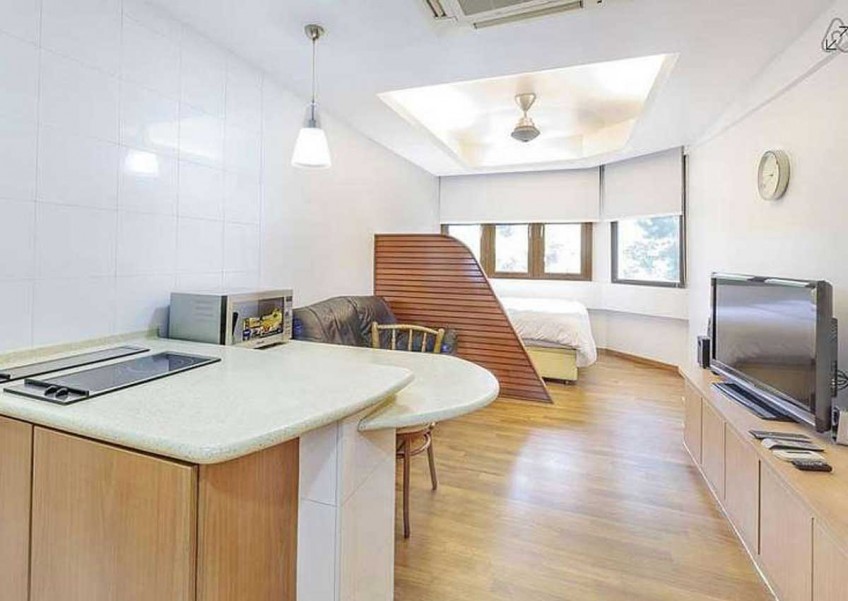Beach Road 'hotel' still draws in tourists

A condominium in the heart of the Bugis district is attracting tourists who rent units there on a short-term basis, some even for just a night.
This despite the fact that around seven years ago, authorities told property owners at The 101 in Beach Road that operating such "condo hotels" is against the law.
A search reveals that 26 units there have now appeared on home-sharing portal Airbnb, a sign that the operations have since evolved beyond just its own websites. For instance, on beach101.com.sg, a 450 sq ft fully furnished apartment is available for a monthly rent of $3,500.
When The Sunday Times called a number listed on the site and asked if a unit could be rented for two weeks, a woman named Serene replied: "Yes, it can be done."
She added that the units are meant for singles and couples as "the space is too small for kids to run around".
These apartments are listed on Airbnb under a single user named Hannah, with units listed from $111 a night.
Airbnb users have left more than 1,700 reviews on Hannah's profile, with some saying that they had stayed at The 101 between a night and a couple of weeks.
The Sunday Times understands that all six units on the third and fourth floors are currently used to operate the "condo hotel", as well as half of those on the fifth and sixth storeys.
The Urban Redevelopment Authority (URA) stipulates that private residential properties should be rented out for a minimum of six months. The rules apply to The 101, which is a strata-titled development comprising a mix of residential and commercial units over six storeys.
The stipulation is "meant to safeguard the living environment of residents, and ensure safety and privacy for neighbours", a URA spokesman said.
Last year, a total of 377 complaints about short-term stays were lodged with the authority.
When The Sunday Times visited The 101 on a Monday afternoon, several tourists could be seen leaving and entering the building.
A couple from Germany, who declined to be named, said they chose The 101 as the small building offered greater privacy than hotel chains in the vicinity.
Also, their three-night stay, which they had booked through Airbnb was "much cheaper", costing them less than $500 in total.
"The location is handy for tourists," added Mr Mark Sigmund, an Australian in his 50s who has stayed at The 101 more than 20 times. "You can easily get on a bus or MRT from here to all the must-see places in Singapore."
His third-storey apartment cost $150 a night for about two weeks. It has a living area, a fully-equipped kitchen and a bedroom with an ensuite bathroom. A perk that keeps him coming back to The 101 is the free daily laundry service.
He shared that a housekeeper used to serve breakfast on weekdays at the building's "garden terrace", though this stopped last year "because she was too overworked, when all the guests would arrive for breakfast at the same time".
The terrace is fashioned out of a yard area on the third storey, which now requires an access card to enter.
"It doesn't make sense. As residents, we should be allowed to walk freely where it is common property," said Mr Lim Qin Yi, whose father owns a commercial unit on the first storey.
An access card is also needed to tap into the common corridors on all floors, the 27-year-old administrative assistant added.
In 2009, The Sunday Times reported that residents complained that the building had allegedly been turned into a hotel by a Mr Tan Fung Chuan, who had sub-divided several units there and then offered them as short-term leases.
While Mr Lim has alerted the authorities on many occasions, he has not been able to take action against the offending property owners. He said: "Somehow, the mastermind of the operation, Mr Tan, has always found ways to evade the URA."
Several frustrated residents have since sold their units or chosen to rent a house elsewhere.
A URA spokesman told The Sunday Times: "We have completed our investigations and will take enforcement action against all culpable parties, including the property owners if necessary."
He added that investigations into such offences are often "time-consuming" as they involve a number of different property owners, intermediaries, tenants and occupants.
"URA is also reviewing our legislative provisions to enhance our investigative powers to take errant offenders to task," the spokesman said.
In January last year, the URA launched a public consultation exercise to review its guidelines on short-term rentals in private residential properties amid the rising popularity of websites such as Airbnb.
It added that while the review is under way, existing guidelines are still applicable.
Private home offenders can be fined up to $200,000 and jailed for up to a year.

This article was first published on March 20, 2016.
Get a copy of The Straits Times or go to straitstimes.com for more stories.